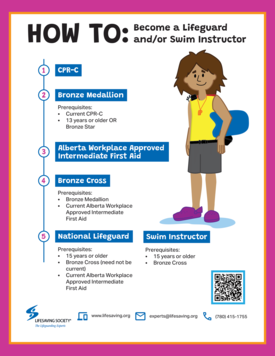Lifeguarding

(click to enlarge the image and learn more!)
National Lifeguard has been Canada's standard for professional lifeguarding since 1964.
The National Lifeguard program develops the basic lifeguarding skills, principles, and decision-making process to help lifeguards evaluate and adapt to different aquatic facilities and emergencies.
The primary role of the National Lifeguard is the prevention of emergency situations and the timely and effective resolution of emergencies.
The National Lifeguard certification is backed by a full range of safety services provided by the Society that support the design and operation of safe aquatic facilities that lifeguards work in.
National Lifeguard certification is available in four options - Pool, Waterpark, Waterfront, and Surf.
National Lifeguard Certifications |
Description |
Pre-requisite(s) |
|
National Lifeguard - Pool |
Trains lifeguards in safety supervision and rescue in a pool environment |
Bronze Cross, current AB workplace approved Intermediate First Aid (Aquatic Emergency Care is recommended), and minimum 15 years of age |
|
National Lifeguard - Waterpark |
Trains lifeguards in safety supervision and rescue in a waterpark environment |
National Lifeguard Pool |
|
National Lifeguard - Waterfront |
Trains lifeguards in safety supervision and rescue in a waterfront environment |
Bronze Cross, current AB workplace approved Intermediate First Aid (Aquatic Emergency Care is recommended), and minimum 15 years of age |
|
National Lifeguard - Surf |
Trains lifeguards in safety supervision and rescue in a surf beach environment |
National Lifeguard Waterfront |
National Lifeguard training is consistent across Canada. National Lifeguard awards can be transferred between provinces and territories.
If you have any lifesaving or lifeguarding certifications from outside Canada that you would like to have reviewed for transferability, please email us at Experts@LifeSaving.org copies of the official certification cards. If your certifications are not in English or French, please provide translation.
For more information on Lifeguarding, refer to the Policies & Procedures.
